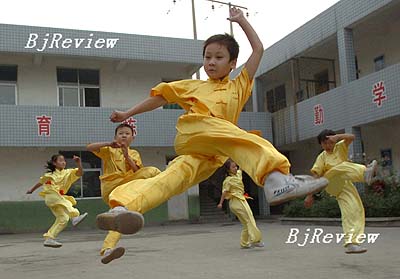|

Birth of New Laws
The Standing Committee of the National People's Congress, China's top legislature, started a five-day session on October 24 to review eight draft laws and amendments.
Four bills, including a draft law on urban and rural planning, an amendment to the Civil Procedure Law, a revised edition of the Attorney Law and a draft of the revision of the Law on Energy Conservation are likely to be put to a vote.
Other laws tabled for lawmakers to discuss included a draft administrative mandatory law, China's first law to regulate government administration and prevent abuses of power, a draft law on prohibiting narcotics, a draft bill on mediation and arbitration of labor disputes and an amendment to the Law on Road and Transportation Safety.
Olympic Bonus
The coming Olympics has created 600,000 jobs every year since preparations started in 2001, announced Liu Jingmin, Vice Mayor of Beijing and Executive Vice President of the Beijing Organizing Committee for the 2008 Olympic Games.
Liu said at a recent press briefing that Beijing has benefited from preparations for the coming Games, which is scheduled to open on August 8, 2008.
Beijing also saw 3.9 million overseas tourist arrivals in 2006, 1 million more than in 2001, Liu said. In the past five years, according to him, the annual increase of gross domestic product in Beijing reached 12.1 percent on average, with the amount last year at 770 billion yuan and the per-capita figure at $6,300.
IPR Professional Shortage
China's booming economy will need the skills of between 55,000 and 60,000 experts in the field of intellectual property rights (IPR) by 2010, said Professor Zheng Shengli, Dean of the IPR School at Peking University, who bases his claim on the proportion of IPR professionals to researchers and developers.
Only about 3,000 IPR professionals have been turned out by universities over the past 10 or more years because universities have been slow to teach the subject, Zheng said.
"The shortage of IPR professionals will hamper the development of IPR protection, which will consequently slow down progress in scientific and other related research areas," said Xie Xiaoyong, Director in charge of development of the Research and Development Center of the State Intellectual Property Office.
Relaunching an Aged Workshop
The remains of the world-famous imperial porcelain factory in Jingdezhen City of Jiangxi Province has opened to the public after two years of preparation work.
The historic site had been sleeping quietly underground in the suburb of Jingdezhen for hundreds of years, before it was unearthed in 1982 by a scholar on ancient ceramics. Large-scale excavation began in 2002, and the construction of a protective house over the site started in 2005. Now the site has become a museum.
Jingdezhen has a long history of porcelain making, and produced porcelain wares for imperial use for hundreds of years. The factory was founded in 1369, soon after the Ming Dynasty commenced in 1368.
Largest Lake Studied
Construction has begun on a center to facilitate academic research on Poyang Lake, China's largest fresh-water lake and an internationally important wetland, in Jiangxi Province.
The center, which is expected to be completed in three years, will comprise a general-purpose station, observation outposts that will track the impact of the Three Gorges Project on the ecology and environment of the Yangtze River at its lower reaches, and a facility for the prevention and control of water-borne diseases such as schistosomiasis.
It will also include a laboratory, a museum, an emergency response workshop, and host three websites dedicated to lakes in Asia, lakes in China and ecological and environmental statistics concerning the 3,583-square-kilometer lake.
Poyang Lake, which empties into the lower reaches of China's longest river, the Yangtze River, has suffered from problems such as deterioration of water quality and shrinkage of the wetland following rapid human expansion. | 